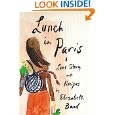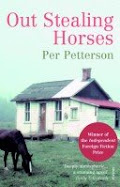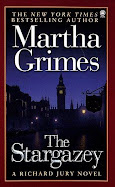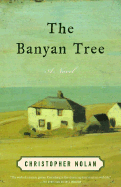Sunday, May 31, 2009
'Mr. Pip' by Lloyd Jones- Cinnamon's thoughts
The opening line of the book is as memorable as the opening line of 'Great Expectations' ('My father's family name being Pirrip...'), which is quoted in this book. The whole book is one of those memorable books, the story, the words, the settings , the characters staying with you for a long time after reading it.
This book was an education to me! Just as reading 'Half of a Yellow Sun' I learned about the Nigerian Civil war, this book told me of a conflict in the Southwest Pacific, the Bougainville Civil War. I love books that send me straight to Google, to find out about peoples and histories I has never even heard of before. Lloyd Jones describes the horrors, the atrocities of this conflict with such a vivid recall and with such an understanding of how they might affect the young minds witnessing them, that you feel that he must have talked to people who had been through these things. I was interested to learn that he was previously a journalist covering the embargo of Bougainville. In some respects he is telling the story of every war-crime victim. This is what fiction can do.
I was also interested to learn (and this may be of interest to other writers and authors) that he wrote no less than eleven versions of this novel. First prize for persistence, for seeking excellence.
Now to the story- where to start? It is such a rich book.
The pace of the book was interesting- very slow at the beginning. Then you realise that you are 'waiting' with these islanders for their fate. As the embargo takes hold, and the last boat leaves, and the school closes, Matilda the young narrator says ..'we had all this time on our hands..' then 'Now we had an idea of what our time was for- it was to be spent waiting'. Waiting for the unknown terrors that await them, for the deaths that must surely come as the medicines run out and malaria takes it's infant victims. With the islanders we are distracted and intrigued by the way the reading of 'Mr' Dickens affects their lives. Needless to say, the pace accelerates as events unfold and in the latter few chapters, years are covered.
I loved the way the book illustrates how reading a novel can be an escape. How precious is the written word. So precious that after their one copy of 'Great Expectations' is destroyed the children, under the guidance of Mr Watts, set about retrieving the book, each contributing fragments from memory. It is later revealed that Mr Watts had been removing the 'embroidery' from Dicken's language, removing difficult, perhaps unnecessary words from the narrative in order to make the story more accessible to the young ears. He does this after a 'discussion' with Dolores, Matilda's mother, who complains about the word 'insensibly'. She makes a good argument and Mr Watts, demonstrating the huge respect he has for the opinions of his fellow islanders, then, in effect, becomes a scriptwriter. Hallelujah for script writers and directors who make works of literature, such as Shakespeare and Chaucer, accessible to modern minds. In doing this, the effect of Dickens' words were not diluted. They permeated the minds of the young listeners, and in Matilda's case they became her saviour, her healing, her 'raison d'etre'.
A nice little denouement, discovering that Mr Watts was an amateur dramatist. Pulling Grace on a cart, wearing a clown's nose- was this an act of humility? After all the 'white' missionaries and governments, the 'white' exploitation of the copper mines had probably served to bring about these awful events. Or was it an act of affrmation of their relationship- their 'communing of minds', their equality?
Another nice little contrast was the contrast between Mr Watts' 'teaching' and the formal teaching the children had previously received- 'to write an essay about the Duke's visit'. The meaninglessnes of such a task is underscored by the children's hilarity that the white people 'weren't any good at sitting on the ground'!
I liked Grace's mother, Dolores. She tries to make sense of her small world as best she can. Her facade of sternness hides a shy, private person, saddened by her enforced separation from her husband. She is determined to make the best of things, but she is ultimately a truly tragic character. Although she is dogmatic, superstitious and fearful in her faith in the end she is a brave witness to the horrific demise of her 'old adversary', Mr Watts. Although it is too late to save him, she sacrifices herself in order to be a witness to the Truth. In the end, what her God requires of her is greater than her fear for her own life. The sucking noise made my the redskin officer as her murder goes on behind him made me shudder. This was awesome writing. I cried.
Storytelling and its power to transform is a theme throughout the book. All the characters- all the villagers have stories to tell, and they are invited by Mr Watts to the school to share their own stories with the children. Mr Watts' 'tales by campfire' to the rebels shows how the stories touched all hearts.
In the end, Matilda's writing of her own story, when rising from her depression she pens the first line 'Everyone called him Pop Eye', is the her own catharsis. Mr Watts becomes her Dickens and his legacy is life-changing.
'..he taught us how to re-imagine the world, and to see the possibility of change, to welcome it into our lives.'
A life-changing book, actually!
Friday, May 29, 2009
Choosing Books
Hi everyone!
I have taken the liberty of adding Fugitive Pieces as the July read, as it seemed from the comments that it was a popular choice.
You are going to have to help me out here! I tried to create a 'poll' on the side bar with all the suggestions for fiction books and non-fiction books so that we could 'vote' for which book we would like to read next. However- it didn't work!! Does anyone think this might be a good idea?
Barbara was asking who the 'paid-up members' are. If you mean the blog 'authors', they are those listed on your profile. However- if we are going to 'take it in turns' to choose, it might be useful to have a list of 'authors' on the side bar with the month they will be expected to choose for. Personally I prefer to throw open suggestions to anyone who wants to come here, read and comment.
What do you think?
ps I will be posting on Mr Pip soon!
Thursday, May 28, 2009
Mr. Pip
tut
Wednesday, May 20, 2009
Brief Wonderous Life of Oscar Wao

A while back a friend of mine recommended this book as an excellent read, and then in early April I was wondering around at the local farmer's market and toddled into the prerequisite used book store. A flyer announced that the book store would be hosting a book club featuring this book. Unfortunately, I thought the meeting was tonight, but I realized earlier today that the book under discussion was something by Salman Rushdie and not Junot Diaz.
Anyway, I'm glad I read it even if it was too early.
This book appears to be a biography of sort of one Oscar de Leon. The narrator, Yunior (Junot Diaz) occasionally stops the narration to explain things, sometimes in great detail and always with a great deal of humor, usually of the noirish variety), in footnote form. It reads many times like an unauthorized historical account.
The title character is a young Dominican man who is sooo not the stereotypical Dominican male. He a sci-fi nerd of the highest order and goes through life reading all manner of sci-fi books, watching various sci-fi television shows and films, and uses high falutin language with everyone at all times.
Though really I have practically nothing in common with the title character, I do feel a certain kinship with him. Hispanic, big reader, loves sci-fi/fantasy, and thinks and uses words that are just not in vogue anymore. I actually think in that narrative style, those high falutin words when I frame my thoughts. Then I have to translate it all into everyday language or run the risk of not being understood by friends and family, or just being thought of as an incredible snob and otherwise pretentious.
Anyway, has anyone else read this book?
Saturday, May 16, 2009
I would like...
Fugitive Pieces
Anyone else have suggestions for the summer?
Sunday, May 10, 2009
Open Door Policy!
Feel free to add a contributor any time you like - just go to the Settings tab, click on Permissions, and then Add Authors.
I am not sure if an author even needs a Blogger profile, I think just an email address will do it.
Enjoyed the posts and comments on Stargazey.
With a series and especially a detective series, there are always many returning characters mixed in amongst the new ones, and I agree it can get confusing if you haven't "grown" with the characters from the start - and it can be hard to keep track!
Looking forward to Mr. Pip and hopefully I will be able to get a post in, this time.
Cheers to you all and for those that celebrate it, Happy Mother's Day to all the mums not forgetting Subby's!
Friday, May 1, 2009
Barbara's thoughts on The Stargazey

I don’t often read mysteries, so it was somewhat exciting to launch into a book destined to be a “who done it?” I was not disappointed in that regard.
I actually think Martha Grimes’ greatest strength was in her character development. She told us enough about each character, from Melrose to Linda Pink to the Fabricants, to allow us to create a fairly good mental image of them.
But there were so many characters and I often forgot some of the more minor ones as the story progressed and then they would reappear. Whereas Out Stealing Horses might have been criticized for having too few characters, The Stargazey possibly errs in the opposite direction.
I found myself longing for certain characters, like Father Noailles or Linda Pink or young Sophie, to take a more leading role in the denouement, whereas they simply dropped away and in Sophie’s case turned out to be fabricated.
I really loved some of the descriptions of scenes, like the men’s club in London and the home of both Mona Dresser and Ilona Kuraukov.
From the beginning, we see the killer Dana as a ruthless woman who lets no one get in the way of her objective. She kills with no remorse. And yet she lets Melrose and Jury off with hardly a scratch when she had ample opportunity to kill the only two people who had figured her out.
In the end the mystery is explained, but the villain(ess) gets away with the goods. I suppose that sets up the scene for a sequel, but it seems a little unfair after 400 pages to let her get away.
Then there’s this business of stars. They are everywhere in the book:
-- The Stargazey (pub)
-- starry-gazey pie (a real thing)
-- Diane’s interest in stargazing
-- the magical Stardust shop in London with its night wood scene
-- Father Noailles as the amateur stargazer with a telescope in his room
-- Kate McBride (the fake) sitting at an outdoor cafe in Brussels where there were so many stars
-- “It wasn’t in the stars” for Jury to follow Kate (the fake) onto the palace grounds.
-- Jury’s dream of Chief Superintendent Racer at a fun fair at the top of the big wheel, stuck against a black and starless sky
One would think with all this mention of stars, they would have something to do with the plot itself. But as far as I can tell, Martha just seems to be fascinated with stars.
The comment on the art itself was so accurate. The wonderful pieces of Bea Slocum were being totally overlooked because of Ralph Rees’ “Snow” pieces.
I’m afraid there were parts of the plot that I simply could not follow. By the end I sort of knew what happened, but there were many connections I had missed. Perhaps a second read would point them out. In a way, the false leads had somewhat obliterated the real ones, and of course one doesn’t know the difference the first time through.
The Stargazey was nonetheless a good read. I will keep my ear out for news of Dana and the smuggled Chagall.











